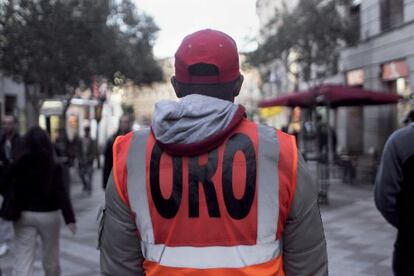Scales of injustice: six out of 10 gold traders' balances prove faulty
Some merchants in Madrid are reported to have shown "violent attitude" toward inspectors


That all that glisters is not gold is something we all know. But other things related to the buying and selling of this precious metal are less obvious. Sixty percent of the scales used in Madrid gold merchants' stores are either inaccurate or will not be submitted to testing by their owners, according to a report by the regional Directorate General of Industry.
The study reveals that during a surprise inspection on March 29 of a number of premises containing a total of 37 scales, only four out of 10 devices showed the correct weight. What's more, some of the owners of the businesses visited showed a "violent attitude" toward inspectors, who had to leave without properly carrying out their jobs.
The Madrid regional government now says it is going to begin taking action against all business owners whose scales don't measure up adequately or who refuse to have them tested, dishing out fines of between 3,000 and 12,000 euros and even moving to close certain establishments.
The weights were not authorized or the measuring instruments were defective"
The number of businesses buying and selling gold has rocketed in the capital since the start of the crisis. Every day thousands of people are finding themselves forced to sell their jewelry to make ends meet. "We are talking about the fact that it is people who are left with very little who come to these stores and they are selling off their family jewels out of necessity," say sources at the Directorate General of Industry. "For them, a deviation, not just of grams, but of milligrams, is very important."
According to a study released at the start of the year by the OCU consumers organization, the price a seller can get for their gold can vary by 400 percent - between 12 and 47 euros a gram - depending on the shop visited.
This is not illegal - traders are free to offer whatever amount they deem worthy, and it is up to the seller whether they accept it or not. But what is illegal, the OCU report says, "is not showing us what the scales weigh and, when they do so, the result not coinciding with the real amount. In 97 percent of cases they weighed it as less."
According to the directorate sources, two types of scales exist in these kinds of store: traditional and digital. The study found irregularities with both. "The weights were not authorized or the measuring instruments were defective," the report reads.
The directorate had wanted to carry out inspections on 50 establishments, but the violent attitude of some owners curtailed the number to 29 for the time being. The regional government is now waiting to receive a list of all gold and jewelry traders operating in Madrid from the government delegation, which they are obliged to notify of their business, after which it plans to send out letters reminding them of the rules regarding measurement and eventually restart the inspections.
All weighing scales and precision instruments used for commercial purposes are required to pass an approval and evaluation procedure every two years, or whenever they are repaired or modified, to check the results they record are within the error margins permitted.
Tu suscripción se está usando en otro dispositivo
¿Quieres añadir otro usuario a tu suscripción?
Si continúas leyendo en este dispositivo, no se podrá leer en el otro.
FlechaTu suscripción se está usando en otro dispositivo y solo puedes acceder a EL PAÍS desde un dispositivo a la vez.
Si quieres compartir tu cuenta, cambia tu suscripción a la modalidad Premium, así podrás añadir otro usuario. Cada uno accederá con su propia cuenta de email, lo que os permitirá personalizar vuestra experiencia en EL PAÍS.
¿Tienes una suscripción de empresa? Accede aquí para contratar más cuentas.
En el caso de no saber quién está usando tu cuenta, te recomendamos cambiar tu contraseña aquí.
Si decides continuar compartiendo tu cuenta, este mensaje se mostrará en tu dispositivo y en el de la otra persona que está usando tu cuenta de forma indefinida, afectando a tu experiencia de lectura. Puedes consultar aquí los términos y condiciones de la suscripción digital.








































